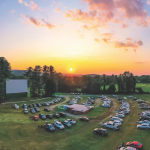
Trying to follow developments around the Covid-19 virus pandemic is like a cat trying to corner a laser spot on the kitchen floor — both move too quickly and too unpredictably to get hold of. But looking at what’s been happening might give us some idea of what’s waiting at the end of this tunnel.
Last month, we looked at what, at the time, seemed the most obvious problem, which involved the constriction of the pro-audio supply chain from China. That’s a real problem — as mentioned then; developing alternative supply sources is not going to be easy or fast, and it will remain so for some time to come. But it pales beside the bigger problem that’s emerged since then — the decimation of the live music industry.
In March and April, there was a nonstop recitation of canceled concerts and tours, with iconic music festivals like Coachella and EDC announcing postponements (for the optimists) or outright cancelations (for everyone else), as well as a steady stream of music venue closures. But the underlying tragedy is the sudden loss of work for the thousands of support professionals, without whom these shows would never have gotten on the bus in the first place.
I spoke with a number of veteran FOH and monitor mixers, and although they had lived through the Great Recession, all said they had never seen touring come to such a screeching halt. Coming as it did at the very beginning of the year’s tour season, it’s put them behind a very large eight ball.
“I have heard about some bands offering to give a crew member a loan against touring in the future,” one longtime mixer emailed me. “But for the most part, with no union, and handshake contracts, freelance sound engineers and crew are on our own.”
That about sums it up. A fortunate few report that longtime artist or management-company clients have agreed to retainers, but even those rare arrangements are limited to a month or two at best. The unpredictability of the contagion keeps even the most beneficent of employers from going out too far on a financial limb. “There are no unions for freelance FOH and monitor mixers,” says Tony Cotrill, an educator and mixer in Nashville. “I’m not only a freelancer but also a small business owner, but this one has blindsided me and just about everyone else.”
A number of initiatives have quickly arisen that purport to raise funds for crew. That’s potentially great, but it’s also important to keep in mind that putting out a press release and actually making sure any donations are properly accounted for and distributed to where they’ll do the most good are two different things. Enough said there.
Some surprisingly useful legislation, though, has arrived. The CARES Act gives states the ability to provide unemployed workers an additional $600 per week in unemployment-insurance benefits, waives the usual waiting period, and expands eligibility to self-employed and independent contractors (like most of us), as well as granting up to $1,200 for individuals, $2,400 for couples, and $500 for each eligible child.
Furthermore, Federal income taxes now don’t have to be filed until July 15, estimated taxes can be delayed until October 15, and the act will make it easier to use retirement savings without penalty. The legislation includes unprecedented unemployment benefits for sole proprietors and independent contractors, who will be eligible for low-interest and no-interest loans. (What might be better in the long run is implementing something like France’s intermittent du spectacle system, in which non-salaried entertainment industry workers who have worked over a minimum number of hours in the previous year are eligible for a daily stipend for the up to 12 months between gigs.)
Virtual Venues
Some of what’s going on now points to some trends for the future. For instance, Willie Nelson’s annual Luck Reunion music festival canceled the live version but did put on a live-streamed concert held in its place in March, with guest artists streamed in remotely from homes and studios. Variations on that theme have proliferated. StageIt (an online concert production we wrote about in this space back in 2014) is still around and may become more relevant than ever in coming months. These shows don’t need to take out a semi’s worth of gear, but they still need to be mixed and monitored, providing some work opportunities. However, as industry researcher Mark Mulligan points out, “Live streaming of concerts is still nascent and Covid-19 may have come a little too early for the sector to truly capitalize.”
The Forecast
The current dynamic in which the rich get richer, etc., isn’t likely to change once this is over. Thus, the other side of this mess will see an even more consolidated concert business with fewer and larger players. Live Nation (which just shored up its cash position), AEG and handful of other dominant production companies will gobble up the smaller ones that couldn’t survive a spring (and possibly a summer) without shows. I’d expect the same will happen to a lesser extent among systems manufacturers and sound-reinforcement providers. Access to capital will also be critical to accomplishing that, and with the stock market at pre-2016 levels, it opens the door to even more venture-capital agglomeration in this business.
What will certainly happen, though, is that the pent-up demand for live music, bottled up for months by the virus, combined with the need by everyone to get back on the road and generate revenue, will make the return of live shows an explosive one. (Anticipating that, The Eagles have already announced an optimistic September start for their postponed summer tour.)
Managing that will be challenging and present its own set of problems. Ideally, the business will come back in stages, with restrictions on large gatherings easing regionally at first. We may also find that virtual venues will have become an integral part of the industry going forward, just as brick-and-mortar stores have incorporated their own online sales portals. If a venue has a strong brand, just like an artist with an active fan base, there may be real value in an installed simulcasting package that’s a regular part of its offerings.
But putting the infrastructure around touring back together will need something like an entertainment version of the Marshall Plan after WWII. Whenever it happens — and it will — you’ll need to be ready. So in the meantime, take courses, and take advantage of the support programs being rolled out for this, such as relief from college-loan debts and mortgage forbearance. And keep the faith.
Resources and Relief
Here is a short list of links to organizations that are making a difference, including Live Nation’s Crew Nation fund, which will provide monetary relief for concert crew members including tour managers, production managers, riggers, audio engineers, and others impacted by the global cancellation of shows, tours, festivals and conferences.



